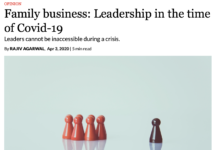Interview with Dov Baron, Author, Speaker, and Leadership Coach
What are the ingredients of a strong company culture? In most cases, it is the result of hard work, consistency, and accountability; characteristics adopted by owners and employees alike. Family businesses are no exception. It might seem tempting to assume that family ownership would result in strong culture and a sense of purpose naturally, however, the reality is different.
Dov Baron is a best-selling author, with 30 years of experience he has been twice cited by Inc.com as one of the “Top 100 Leadership Speakers to Hire”. He is a leading authority on Authentic Leadership and Leadership Succession. His career in this field began after a friend invited him to speak to his board of directors about purpose in business. Dov quickly realized he had valuable insights to share and a vocation was born. Over the years, his expertise has taken him around the globe where he has been the headline speaker for organisations, and global conferences focused on purpose-driven, authentic leadership and cultural strategies.
In this interview, Dov discusses the popular misconceptions surrounding company culture, the similarities and differences between culture in family-owned businesses and their non-family peers, and advice for those families who struggle to identify their driving purpose.

Everyone has an idea of what great company culture means. To some, it immediately conjures up the image of Silicon Valley startups with game rooms and recreational facilities. What are the hallmarks of a healthy and vibrant company culture? ong>
It’s funny isn’t it, so often when we think about company culture, it’s easy to jump to this idea of the ping-pong tables, cappuccino bars, and the bean bag chairs. But that’s not culture. Those are bonuses. When you nail the culture, you nail the brand, and you will grow the company. The three things are inextricably linked. There has been considerable research done that has shown that companies that are purpose-driven over a period of 20 years are 1681% more profitable than their competitors. That’s a significant profit gap based on formulating and operating from a clear purpose.
What companies come to mind when you think of exemplary company culture?
I think this question is best answered with a story that truly demonstrates what naturally happens inside an exemplary culture: A friend of mine bought a Harley Davidson. Early on he took the bike out on the road, he got to a gas station and realizing he was getting low, so he pulled over to gas up. When he went to unscrew the cap, it wouldn’t unscrew (because he was doing it the way he did it with the Honda bike he formerly owned). He made it home and called Harley Davidson who sent someone right away.
<p>Shortly after the technician showed up wearing Harley-Davidson clothing, totally clad in the brand entirely of his own volition. When my friend apologised for calling the technician out for something so simple, the technician replied; “Oh, no problem this happens all the time.” Immediately he showed my friend the specific Harley technique of how the cap opens and then gave him a business card and said, ‘This is my card. Wherever you are, whatever you’re doing, if ever you need me, it doesn’t matter if it’s three in the morning, let me know, and I’ll come and help.’ needless to say, my friend was very impressed by that. So, a little time went by and my friend (a fellow speaker) was preparing a presentation on brands, and he remembered the story. He decided to call the Harley Davidson technician and asked him, “I want to put you in my brand story piece, but I’d like to photograph in your Harley shirt. Would you be willing to do that?” It was 7:30 pm, the technician was at a party. However, he immediately went home, put on a Harley shirt, went to my friend’s house, posed for a photo by his motorcycle and then went back to his party.
This for me is a wonderful example of what happens inside an exemplary culture. Harley Davidson is a company that not only has a purpose, but they live that purpose, the culture marinates in it and their people go above and beyond what is asked of them. So when we think about purpose-based brands with a deeply connected culture, it’s something where employees feel connected to something far bigger than themselves at an almost soulful level. Where the employee will not only tell you, but they will clearly demonstrate; “I am proud to be a part of this.”
Wouldn’t family-owned businesses be naturally predisposed to having that kind of sense of purpose and deep culture already ingrained in their DNA?
Yes and no. The reason that there is no straightforward answer is: We, as human beings are inherently tribal, we want to be part of a group that has significance to us. Tribes come in many forms, with varying levels of intimacy. We may, or may not feel like we are part of the global tribe, a national tribe, and even a religious tribe. However, the individual’s original tribe is the family. We quite naturally feel a strong sense of collective identity with any tribe we belong to.
However, if for some reason we feel expelled, rejected or disenfranchised from that tribe, whether literally or emotionally, it can become a problem with the potential to create massive fallout. Within a short period of time humans will find themselves compelled to go looking for another tribe. The key point here is; loyalty will be to the tribe that is inclusive. As such a family member who feels excluded will become loyal to the tribe that includes and embraces them, even if the new tribe is in direct opposition to the original (or familial) tribe. The fundamental question underlying a strong company and or family culture is “How have you, and do you continue to bond people to your tribe?”

The problem with family business is the assumption of a natural bond to the tribe. The key word here is assumption. If we assume you are bonded to the tribe because you were born into it, that is a mistake. Blood may indeed be thinker than water, but a disenfranchised individual will feel cut off from the heart of the tribe and even if the financial flow remains, the heart, soul and emotional connection will not. This is where we see succession plans fall apart. If a family is focused on systems and forgets or minimizes the individuals that make up the system; the system, the business, the family and the tribe itself are all placed under threat. In my work with wealthy families, it is all too common for us to hear language like: “I know I carry the name. But I never feel like my voice is heard. I never feel like I matter. I never feel like my ideas count” These are the words of an individual who for whatever reason feels somehow disenfranchised from their family tribe. Sadly, in coaching, we all too often hear this from the individual who is next in line to take over the family business.
The reason we have to talk about family businesses culture separately from that of other corporate cultures is specifically due to this often false assumption of inherent loyalty. Even in the family business, we have to constantly be bonding our talent to us and understand that our family members have to be assessed by talent. When we’re developing business culture, one of the first things that matter is to have people play to their strengths.
However, in a family, we may see someone whom we’d really like to become the next in command, but despite being sent to the right business schools and having received the very best education, we may have to face the fact that maybe that’s not who this individual is at their core. This is not the place for stricter systemised governance, but rather what is needed and rarely applied is a healthy governance of the psychology. This means; rather than making assumptions, being genuinely willing and committed to finding out who the person really is and what sets their hearts and souls on fire. What might happen to the quality and depth of your family and the business attached to it, if you invested the time to find out what mattered most to each individual member of the family outside of the context of money? In other words; who do they see themselves as being and aspiring to be even if there was no money or power?
One perceived advantage of the family business structure is its comparative informality. How important is it to explicitly formulate a company culture document or guideline?
One of the great downfalls of traditional business in today’s business environment has had its roots in formality and rigidity. The research constantly shows that the Millennial generation (those born between 1980 and 2000) and Gen Z, (those born after 2000) want to be heard, they are not willing to simply follow the formal rules. They want to know that they matter, that their ideas matter and they want open communication about those things. Therefore, it’s not just a need for informality, it’s a necessity for the evolution of business (family or otherwise). However, let me be clear by saying this: The context of informality here is really rapport built through common values and the willingness to demonstrate reciprocal vulnerability. It is crucial that when we use these terms, we dig deeper to make sure we’re talking about the same thing. If we don’t elicit what something specifically means to the individual, we’re going to create (or impose) our subjective meaning on another, and that very rarely works out well…for anyone.
Like I said, we’re all tribal, we all want to belong. But to “belong” means to feel part of something. Therefore, it is important to define the purpose of the individual, the company and the family itself. Know what the business stands for, and what each and every individual family member stands for. It’s in the overlap of the individual, family, and corporate purpose that we define culture. Taking the time to create a manifesto for the purpose that includes the significant players’ purposes is, in my mind, vital.
Family businesses discussions are often about continuity. We want things to carry on and we want to remember what happened in the past and celebrate that legacy. Does company culture have to change regularly?
When we speak of continuity many things can spring to mind like the continuity of the family fortune, its influence and ability to have an impact. However, there is something far more fundamental that is often ignored or at least assumed; the continuity of the family itself. For there to be a continuance of values, business, assets and power there must be a continuance of the family. So, let me start with this – if you wait until succession is imminent to find the bond that is beyond blood, it’s maybe too late. We must find the driving forces of each individual before we can find a unifying purpose to bring us all together. This is not about dismissing past values. However, does the family culture need to evolve? Absolutely, it is the law of nature that for anything to survive it must evolve or else become extinct. Sometimes, the culture needs to change dramatically because it’s unhealthy and dysfunctional. But most cases what’s needed is for the culture to evolve.
The company that Apple was when it started is not the company that Apple is today. Is the purpose still the same? Yes, the purpose is still the same, but there’s an evolution to the business, to the culture, to how it operates to what it does. You can look at all of the major companies that have succeeded and you’ll see this. When considering legacy, it is vital that we look beyond the bricks and mortar, the dollars and cents or even the corporate entities and see that it’s actually the individuals who perpetuate the real legacy.

The family business way is to think long-term. It’s to think about the next generation and even the generation after that. And while patience is required, the speed of change that seems to be happening around them, like the speed of adoption, the speed of innovation can seem overwhelming. How do you make sure that as a family business you promote a culture that values both innovation and tradition?
It’s interesting to me that very often, it’s the younger generation who are actually pushing for both. In the older generations, we often see the attitude of wanting to keep things the way they are. But the world has changed, and if you’re going to try and have success based on how you did things before, that’s a path to failure, as many hundred-year-old companies simply disappeared in the face of an evolving technological and global marketplace.
The way people operate has changed vastly. We are all challenged to both have patience while embracing innovation. How do we bring those two seemingly contradictory things together? First, we have to first separate them in order to bring them together. We must look to what changes are going to give the family business a competitive advantage. Then we evaluate which parts of our family tradition and also our family talent can help us achieve the highest possible advantage. From here we leverage innovation off of tradition. This is an ongoing process that we should be part of for the rest of our lives as a family and a family enterprise. Remember those who evolve the fastest gain the most, and those who refuse to evolve will fade into oblivion, despite their past successes.
What is your advice to someone who is about to join the family business or maybe hasn’t found their place in the culture before?
It’s easy to look at joining the family business as a wonderful opportunity, and it is. However, I would caution that individual to not take becoming part of the “business” lightly. Most often in the world of successful family business, the people who get involved do so with the intention of being involved for a long time. Therefore, consider this: Everything that applies to the family, applies to the person. So firstly, take the time to find out what your personal purpose is. Be willing to do the self-discovery work to discover why you are really here, on the planet and potentially in the business. Ask yourself who you are without the money, the accolades, the education. In other words; who is the human being underneath all that? That being said; if you can get there, start looking at what really matters to you. Remember that you are 100% responsible for your life, denying that makes you a victim of circumstance, and I challenge you to consider that you were born on this planet to become a victor.
When you see the discussion of culture and leadership in family business, what do you feel is often missed?
At a very simple level, here’s what I believe. I believe that each one of us is born whole, complete, and miraculous. We all, at least occasionally forget that. In the process of forgetting it, it’s easy to go off track regarding the real reason we go into business, whatever the family business or any business. Yes, we as tribal beings go into business to upgrade the quality of life for our tribe. However, there comes a point where we can be pretty certain that such things are taken care of. I believe from that point on we are in business to reconcile our soul, to recall the disenfranchised parts of ourselves. We stop seeing ourselves and each other as separate, and instead become unified, knowing that even if we don’t understand how, each one of us following our purpose as individuals serves the purpose of the company, the family and the greater good.














